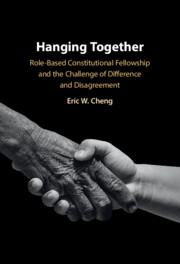 Hanging Together
Hanging Together Book contents
- Hanging Together
- Hanging Together
- Copyright page
- Contents
- Acknowledgments
- 1 Introduction
- 2 Aiming Too High, Aiming Too Low
- 3 Fellowship’s Forefather
- 4 Broadening the Base
- 5 Three Dimensions of Trust
- 6 Principled Pragmatists, Principled Purists, and the Liberal Democratic Front
- 7 Talking, Shouting Back, and Listening Better
- 8 Justifying (and Constraining) Salutary Hypocrisy
- 9 Facilitating Fellowship
- 10 Conclusion
- Index
2 - Aiming Too High, Aiming Too Low
The Limits of Discourse and Contestation
Published online by Cambridge University Press: 07 July 2022
- Hanging Together
- Hanging Together
- Copyright page
- Contents
- Acknowledgments
- 1 Introduction
- 2 Aiming Too High, Aiming Too Low
- 3 Fellowship’s Forefather
- 4 Broadening the Base
- 5 Three Dimensions of Trust
- 6 Principled Pragmatists, Principled Purists, and the Liberal Democratic Front
- 7 Talking, Shouting Back, and Listening Better
- 8 Justifying (and Constraining) Salutary Hypocrisy
- 9 Facilitating Fellowship
- 10 Conclusion
- Index
Summary
Chapter 2 critiques two prominent approaches to the question of difference and disagreement. Engaging with John Rawls and Jürgen Habermas’s accounts of “deliberative democracy,” the chapter first argues that discursive approaches to democracy “aim too high.” They overestimate the degree to which a basic “liberal public culture” is secure, and do not provide convincing accounts of how citizens can become (and continue to be) steadfast liberal democrats who will do what it takes to sustain liberal democracy. The chapter then probes “realist” approaches to democracy. Focusing on William Connolly and Chantal Mouffe’s accounts of “democratic agonism,” the chapter argues that realist approaches “aim too low.” They overestimate the ability of sound institutions to channel difference and disagreement, and do not adequately acknowledge the need for a sense of unity to prevent difference and disagreement from spiralling out of control. This chapter concludes that liberal democracy must be supported by a sense of unity that is oriented toward the preservation of liberal democracy and that does not unduly suppress difference and disagreement.
Keywords
- Type
- Chapter
- Information
- Hanging TogetherRole-Based Constitutional Fellowship and the Challenge of Difference and Disagreement, pp. 19 - 46Publisher: Cambridge University PressPrint publication year: 2022
